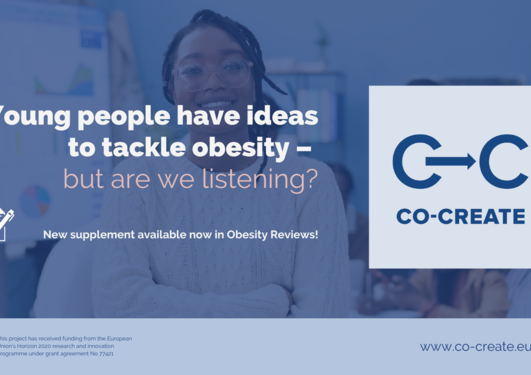Tackling the obesity crisis in Europe – findings from the CO-CREATE project.
This week, a series of scientific papers from CO-CREATE (EU-funded project), focusing on combatting obesity among adolescents, have been featured in special issue published by Obesity Reviews.

Main content
Adolescents hold the potential to shape future policies and parenting approaches, making them influential agents of change. Conventional obesity research typically emphasizes dietary and physical activity aspects, but the European Union-funded CO-CREATE project takes a different approach. Instead of imposing solutions, the project sought input directly from young people to understand their challenges and what they believed should be prioritized.
Researchers from CO-CREATE convened workshops with young individuals and developed methods to assess their perspectives. It became apparent that the modern youth's world has significantly changed with the rise of technological innovations. As one adolescent aptly put it, "You inquire about access to green spaces, but I primarily live online." For young people, obesity is intertwined with a broader context, encompassing their peer groups, body image, self-esteem, and autonomy, all of which are influenced by media figures and role models—some backed by commercial interests spanning fashion, cosmetics, music, and sports.
The CO-CREATE project's findings underscore that addressing obesity in young people involves understanding their social and psychological experiences, bolstering their mental resilience alongside their physical well-being, and facilitating environmental changes to support healthier choices.
As collaborators, Birgit Kopainsky, Anaely Aguiar, and Furkan Onal from the System Dynamics Group at the University of Bergen contributed to the novel approach with deployment of systems thinking and system dynamics tools in obesity research. Reflecting on her work in CO-CREATE, UiB Research Fellow, Anaely Aguiar emphasises that "youth obesity is a very complex health issue and System Dynamics is a suitable methodology not only for demystifying that complexity, but also addressing it through policies that target root causes."
The team at UiB led the development and testing of simulation models on overweight and obesity in children and adolescents, one of the key outputs from CO-CREATE. Presently, they are working towards communicating their work and findings with the wider public through a self-guided interactive learning environment.
Summary of papers co-authored by SD Group researchers
Now available on Obesity Review's website
1. Reducing psycho-social stress can reduce obesity prevalence
Adolescents in six European countries identified the role of mental wellbeing as a key driver of youth obesity. Building on these findings, a simulation model was constructed linking poor mental wellbeing to changes in dietary, physical activity, and sleep behaviours, and was found to have a good fit with known survey data and previous research. The model showed that socio-cultural pressures and stressors can be linked to emotion-related eating, lack of interest in physical activity, and sleep difficulty. It was found that if pressure on body image and psychosocial stress could be reduced by 25% it would lead to a reduction in overweight prevalence from 30% to 26% as well as improving mental wellbeing.
Aguiar A. et al (2023) Understanding the dynamics emerging from the interplay amongst poor mental wellbeing, energy balance-related behaviours, and obesity prevalence in adolescents: A simulation-based study.
2. Exposure to social media can increase body dissatisfaction and disordered eating
Social media can benefit adolescents’ lives but may also have harmful effects on both physical and mental health. A systematic review of existing research found significant links between social media use and depressive and disordered eating symptoms, body dissatisfaction, and anxiety. The findings call for policy interventions to mitigate the impact of social media on adolescent mental health and diet. As social media platforms become increasingly sophisticated, it is important to involve adolescents in the design of research: measures of exposure to different types of online content are needed to guide policies for protecting the health of adolescents.
Blanchard L. et al (2023) Associations between social media, adolescent mental health and diet: a systematic review.
3. Poor mental ill-health can trigger weight gain for young people.
Studies that report links between adolescents’ mental health and obesity may not be able to say which one might trigger the other. Research is needed which follows a group of young people over time (longitudinal study) in order to cast light on this issue. A search of the relevant scientific research found 17 longitudinal studies, and the majority showed that depression, anxiety and body dissatisfaction came before an increase in body weight. The links were likely to be related to eating habits, screen time, physical activity, and sleep as well as stressors like peer victimisation. Furthermore, several studies showed that improved dietary patterns and physical activity may alleviate some mental ill-health.
Nwosu E. (2023) Longitudinal relationship between adolescents’ mental health, energy balance-related behaviour (EBRB) and anthropometric changes.
4. Young people are likely to propose interventions at the local, individual level
A systems approach can be used to distinguish between policy interventions with the potential to make small changes to the operation of structural elements within the system from those with the potential to change how the system regulates itself, how its component parts interact, what goals the system sets out to achieve, and the deepest held beliefs, or paradigm, of the system. Of the 106 policy ideas generated by young people to address adolescent obesity during the CO-CREATE project, 91 (86%) were categorised as changes to structural elements, with an emphasis on operational rather than systems-level responses. This echoes the emphasis on interventions to address obesity shown by most governments, which often operate at the individual level and deal with the kinds of actions and environments which do not challenge the function of the system, or lead to changes in the overall paradigm, despite evidence that deeper structural actions tend to be more effective and equitable.
Conway-Moore K. et al (2023). Co-creating obesity prevention policies with youth: Policy ideas generated through the CO-CREATE project.
5. Models of systems can identify better opportunities for tackling youth obesity
A systematic search of proposals for tackling youth obesity found a wide range of proposed models for intervention ranging from those focused on intrapersonal factors to models cutting across multiple levels of obesogenic systems, but mechanisms for taking action were lacking. Of 15 models studied, the majority of interventions were changes to existing model parameters with less emphasis on models that alter system structure. There is a need for better quality in documentation of the models, and further research on how to best combine models and provide decision tools for policymakers.
Aguiar A. et al (2023). System dynamics simulation models on overweight and obesity in children and adolescents: A systematic review.
6. Systems thinking can be embedded in research projects working with young people
There is growing recognition of the need to move away from conducting research projects as a linear series of constituent parts, and towards study designs that address the true complexity of an issue, while also accounting for the complexity of conducting research as a learning ‘system’ itself. Learning from the experience of the CO-CREATE project, the authors of this paper argue that systems thinking should be embedded in research design when working with young people, for example capturing key adolescent values and concerns; working to avoid social exclusion; ensuring methodological pluralism to allow for reflection and responsiveness (with methods ranging from group model building, PhotoVoice, and small group engagement); getting policy recipients to shape key questions by understanding their views on the critical drivers of obesity early on in the project; and providing opportunity for intra-project reflection along the way.
Knai C. et al (2023). Learning from the CO-CREATE project: a protocol for Systems Thinking Across Research (STAR).
---
The CO-CREATE project is funded by the European Union's Horizon 2020 research and innovation program under grant agreement No 774210. The views expressed in this press release are solely those of the authors, and the European Commission bears no responsibility for any use of the information it contains. This article is adapted from the original press release by the Norwegian Institute of Public Health (NIPH).

